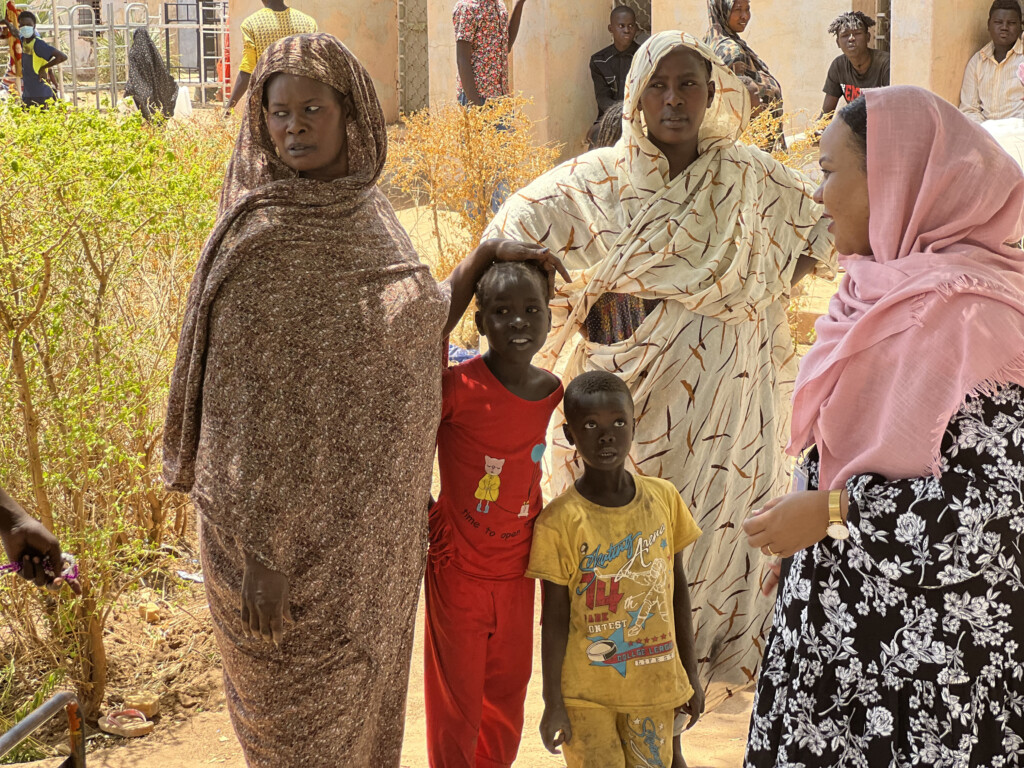USA-Saudi facilitators: ‘Deescalate Sudan conflict or jeopardise Jeddah talks’

People displaced by the fighting in the Sudan capital Khartoum wait in El Gezira for emergency food distribution in El Gezira (File photo: WFP / Lumia Elhag)
KHARTOUM / JEDDAH –
Saudi Arabia and the USA, who are joint facilitators of the Jeddah talks between the warring Sudan Armed Forces (SAF) and the paramilitary Rapid Support Forces (RSF), have cautioned the parties to deescalate the conflict and strictly observe the 72-hour ceasefire that came into effect across Sudan 06:00 today, or risk the Jeddah talks being adjourned.
In a joint statement, the facilitators conform that representatives of the SAF and the RSF agreed to a 72-hour ceasefire across Sudan “beginning on June 18 at 06:00 Khartoum time until June 21”.
The parties agreed that during the ceasefire, they will refrain from prohibited movements, attacks, use of military aircraft or drones, artillery strikes, reinforcement of positions and resupply of forces, and will refrain from seeking military advantage during the ceasefire. They also agreed to allow the unimpeded movement and delivery of humanitarian assistance throughout the country, the joint Saudi/US statement says.
In light of the June 19 humanitarian donors conference, the facilitators called on the parties to consider the immense suffering of the Sudanese people and to adhere fully to this ceasefire and cease the severity of violence.
“Should the parties fail to observe the 72-hour ceasefire, facilitators will be compelled to consider adjourning the Jeddah talks,” the statement concludes.
Monitoring
On June 11, The US Department of State officially launched the Sudan Conflict Observatory remote monitoring platform, that it says will start releasing public reports on violations of international humanitarian law and other abuses. The remote monitoring platform “to provide independent, expert reporting on conflict activity in Sudan,” is a collaboration among the geographic information systems companies Esri and PlanetScape Ai, as well as Yale University’s Humanitarian Research Lab, the US State Dept says.
Referring to the monitoring mechanism in May, US Secretary of State Anthony Blinken warned: “If the ceasefire is violated, we’ll know. And we will hold violators accountable through our sanctions and other tools at our disposal”.
Fragile ceasefires
Previous ceasefires have been marked by frequent violations by both sides. Heavy fighting erupted a week ago, shortly after a 24-hour humanitarian ceasefire – deemed ‘an unprecedented success’ by some quarters – l lapsed last Sunday morning. facilitators of the latest ceasefire, and of the fragile Jeddah talks over the past weeks, note that “during the 24-hour ceasefire that concluded on June 11, 2023, the Sudanese Armed Forces (SAF) and Rapid Support Forces (RSF) demonstrated effective command and control over their forces, resulting in reduced fighting throughout Sudan that enabled delivery of vital humanitarian assistance and the achievement of some confidence building measures.”
As previously reported by Radio Dabanga, the International Committee of the Red Cross (ICRC) has appealed to the parties to the conflict in Sudan to allow the passage of humanitarian aid and to fulfil their commitment to international humanitarian law.
$245 million US aid
In a separate statement from Washington, the US Dept of State says that last week, the USA announced $245 million in humanitarian assistance to Sudan and neighbouring countries countries experiencing the impacts of the ongoing humanitarian crisis. These funds include nearly $143 million from the Department of State’s Bureau for Population, Refugee and Migration and $103 million in additional humanitarian assistance from the US Agency for International Development’s Bureau for Humanitarian Assistance.
“With this funding, our humanitarian partners can respond to the new needs arising from the current conflict, which has displaced approximately 840,000 people within the country and forced another 250,000 to flee since April 15,” the US State Dept says.
According to the statement, this announcement brings total US humanitarian assistance for Sudan and neighbours Chad, Egypt, South Sudan, and the Central African Republic to nearly $880 million in the 2023 financial year.
Sanctions
On May 2, US President Joe Biden called the violence in Sudan a ‘tragedy’, and signed an executive order paving the way for the USA to impose sanctions on “certain persons destabilising Sudan and undermining the goal of democratic transition”. The order extends existing sanctions but does not impose any specific additional sanctions at this time.
In a statement following the signing, Biden called the current conflict in Sudan “a betrayal of the Sudanese people’s clear demand for civilian government and a transition to democracy.”
Biden’s order expands the scope of the national emergency declared in Executive Order 13067 of November 3, 1997 (blocking Sudanese government property and prohibiting transactions with Sudan), and expanded by Executive Order 13400 of April 26, 2006 (blocking property of persons in connection with the conflict in Sudan’s Darfur region), finding that “the situation in Sudan, including the military’s seizure of power in October 2021 and the outbreak of inter-service fighting in April 2023, constitutes an unusual and extraordinary threat to the national security and foreign policy of the USA.”











 and then
and then